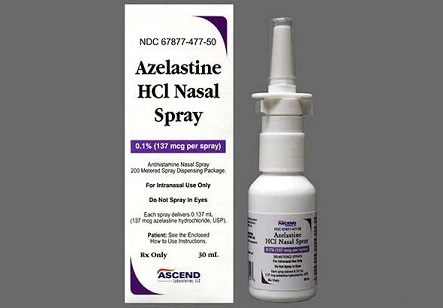Medical News: Study Shows That Azelastine-HCI Is An Effective Broad-Spectrum Antiviral Against Various Respiratory Viruses Including SARS-CoV-2 And RSV!
Nikhil Prasad Fact checked by:Thailand Medical News Team Nov 25, 2023 1 year, 4 months, 3 weeks, 4 days, 12 hours, 47 minutes ago
Medical News: As the world grapples with the ongoing COVID-19 pandemic and the persistent threat of respiratory viral infections, there is a growing demand for effective antiviral solutions. The Medical University of Innsbruck in Austria, in collaboration with CEBINA GmbH in Vienna, sheds light on a potential game-changer in the fight against respiratory viruses - the antihistamine azelastine hydrochloride (azelastine-HCl). Previous research has demonstrated its in vitro antiviral activity against SARS-CoV-2, and a phase 2 clinical study revealed a significant reduction in viral load in SARS-CoV-2-infected individuals using a commercial azelastine-containing nasal spray.
https://www.thailandmedical.news/news/covid-19-meds-austrian-vitro-study-finds-that-nasal-antihistamine-azelastine-could-be-repurposed-to-reduce-viral-transmission-or-as-a-prophylaxis

This
Medical News report explores the broader antiviral potential of azelastine-HCl, encompassing various human coronaviruses, respiratory syncytial virus A (RSV A), and influenza.
The Landscape of Respiratory Viral Infections
Respiratory viral infections, ranging from mild upper respiratory tract infections to severe lower respiratory tract infections, pose significant challenges, especially among vulnerable populations such as infants and the elderly. The adaptability of common respiratory viruses to human-to-human transmission and their endemic nature underscore the need for broad-spectrum antivirals. The unpredictable emergence of pandemic strains, as seen with SARS-CoV-2, necessitates a versatile and efficient response. Current treatment options for respiratory viral infections are often limited to supportive therapy, emphasizing the urgency of developing effective antiviral measures.
The Limitations of Vaccines
While vaccines provide protection against specific pathogens causing severe infections, their limitations are evident in factors such as a short duration of immunity, reduced efficacy in immunocompromised populations, and a narrow spectrum of cross-protection against various subtypes of a pathogen. The annual need for new seasonal flu vaccines and the challenges posed by the rapid evolution of SARS-CoV-2 variants highlight the shortcomings of relying solely on vaccines. This necessitates the exploration of non-specific prophylactic measures to combat a wide range of respiratory viruses.
Azelastine-HCl as a Broad-Spectrum Antiviral
The study focuses on the repurposing of azelastine-HCl, an approved drug with known antihistamine properties, as a potential broad-spectrum antiviral agent. Broad-spectrum antivirals must interfere with general host cellular machinery or compartments utilized by various unrelated viral pathogens, striking a balance between efficacy and safety. Azelastine-HCl has demonstrated in silico and in vitro antiviral activity against SARS-CoV-2, prompting further investigation into its effectiveness against other respiratory viruses.
&nbs
p;
In Vitro Activity of Azelastine Against Coronaviruses
The research confirms the in vitro antiviral activity of azelastine-HCl against major genetic variants of SARS-CoV-2, including the omicron variant (BA.1). The efficacy extends to other human coronaviruses, such as HCoV-229E, emphasizing the broad-spectrum potential of azelastine. The study utilizes transgenic cell lines overexpressing human serine protease TMPRSS2 and the ACE2 receptor to confirm the drug's retained activity against the BA.1 omicron variant.
Prophylactic and Therapeutic Efficacy on RSV Infection
Azelastine-HCl demonstrates significant inhibitory effects on Respiratory syncytial virus A (RSV A) in both prophylactic and therapeutic settings. The study highlights the importance of maintaining the presence of azelastine-HCl during RSV infection for optimal inhibition. The findings suggest that azelastine-HCl may offer a dual benefit by preventing infection and reducing the severity of RSV-induced symptoms.
Protective Effect Against Influenza A in a Human Nasal 3D Tissue Model
The research extends to a human nasal 3D tissue model, providing valuable insights into the protective effect of azelastine-HCl against influenza A (H1N1). The nasal spray significantly reduces the viral load and protects tissue integrity, as evidenced by decreased cilia damage. The anti-inflammatory potential of azelastine-HCl is demonstrated by its impact on reducing IL-8 and RANTES responses to H1N1 infection, further emphasizing its multifaceted antiviral mechanisms.
Discussion and Future Implications
The study underscores the complex and versatile nature of azelastine-HCl's antiviral mechanisms, involving direct action on viruses, modulation of host cell pro-viral factors, and mitigation of the virus-induced host response, including inflammation. The findings, although based on in vitro models, are supported by clinical data showing a reduction in viral load and shortened viral carriage in SARS-CoV-2-infected individuals using an azelastine-containing nasal spray.
As the world seeks robust antiviral solutions to combat respiratory infections, azelastine-HCl emerges as a promising candidate. Ongoing and future clinical studies will provide additional evidence of its efficacy, paving the way for the development of azelastine-containing nasal sprays as a globally accessible prophylactic tool against a spectrum of respiratory viruses, including pandemic strains. The multifaceted nature of azelastine-HCl's antiviral activity positions it as a valuable asset in the ongoing battle against respiratory viral infections.
The study findings were published on the peer reviewed journal: Viruses.
https://www.mdpi.com/1999-4915/15/12/2300
For the latest
Medical News, keep on logging to Thailand Medical News.
